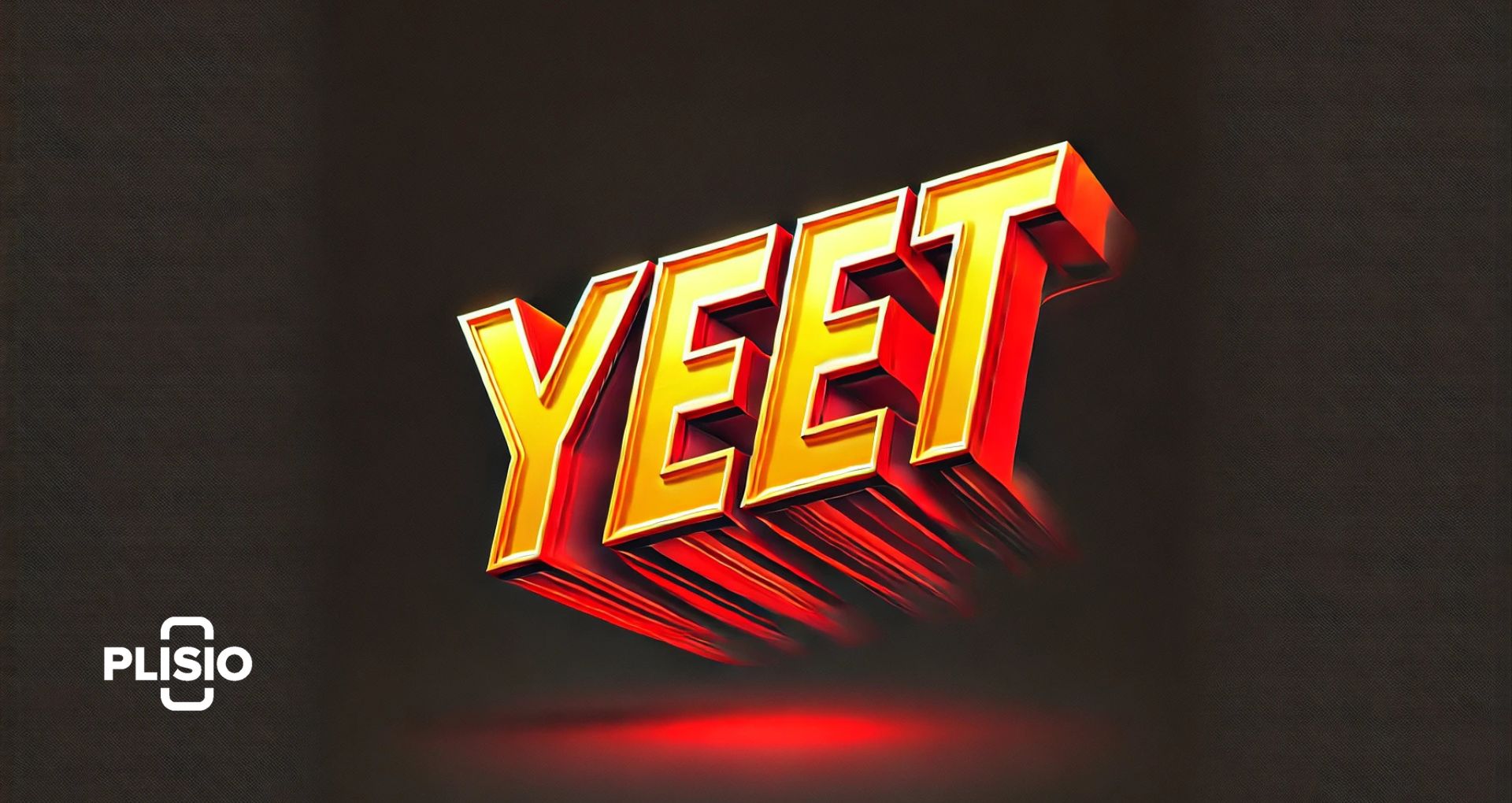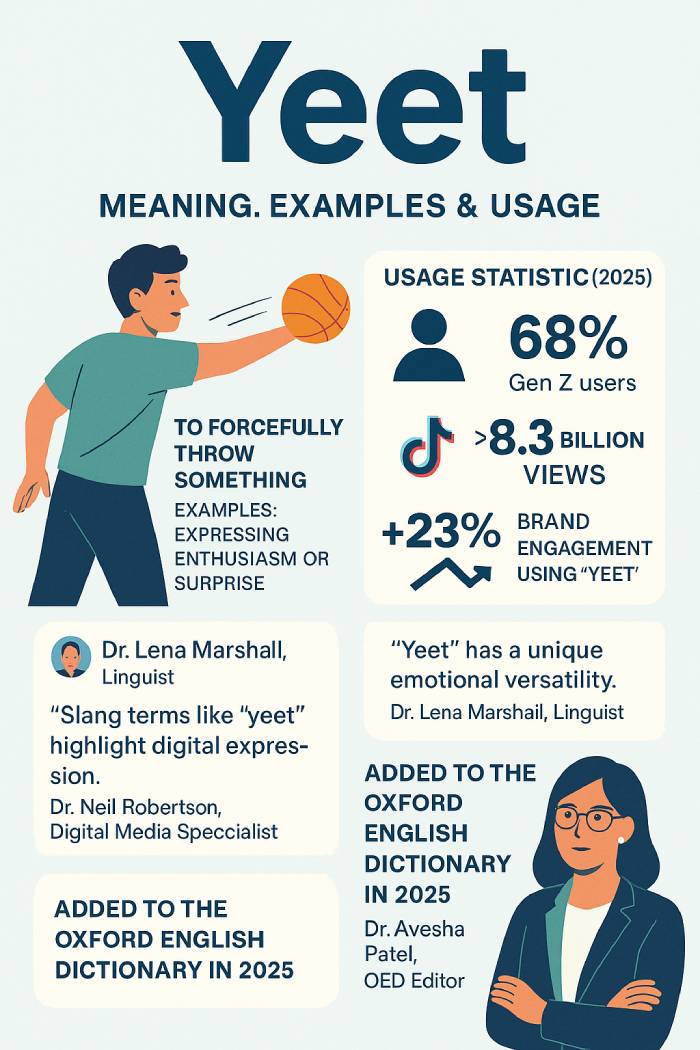Yeet Meaning, Uses and Examples

The slang word "Yeet" has become a mainstay in online conversation, evolving over time to embody a wide range of meanings and emotions. Once a viral sensation, "Yeet" now stands as a symbol of how internet culture influences English language trends. From high-energy exclamations to humorous expressions of approval or surprise, this term showcases how digital communities reshape everyday vocabulary. This article explores the definition, evolution, and ongoing relevance of "Yeet," with insights from linguists and digital culture experts.
Yeet: What Does It Mean?
So, what does "Yeet" mean? At its core, "Yeet" refers to the act of forcefully throwing something. Its first major spotlight came from a Vine video in which a girl launches an empty soda can while shouting "Yeet!"—perfectly capturing the meaning through action. That video helped define the tone for its future usage: energetic, bold, and a little chaotic.
Though Vine played a key role in popularizing the term, "Yeet" was likely circulating in niche online communities before that. Its exact origins remain unclear, but its viral moment on social media propelled it into mainstream English slang.
Today, phrases like "He just yeeted the ball across the field!" illustrate how users apply the term to describe a powerful throw or action packed with enthusiasm.
How Yeet Evolved Over Time
The term "Yeet" quickly grew beyond its original meaning of "throw something". It now carries a strong sense of force, emotion, and spontaneity. Whether used to describe a dramatic basketball shot or a spirited celebration, the word captures moments of excitement and intensity.
As a verb, noun, or exclamation, "Yeet" has become a tool to express enthusiasm or approval. For example, yelling "Yeet!" can express excitement or victory in the heat of the moment. Its versatility mirrors the creativity of internet users who constantly reinvent slang to suit new contexts.
In 2026, over 68% of Gen Z internet users report using the word "Yeet" regularly in digital conversations, according to a survey by Global Language Monitor. Moreover, TikTok videos using the hashtag #yeet have surpassed 8.3 billion views globally, demonstrating the term's wide social media footprint.
According to Dr. Lena Marshall, a sociolinguist at the University of Edinburgh, "The evolution of 'Yeet' demonstrates how community-driven expressions can bypass traditional linguistic structures and still achieve massive cultural resonance. Its success lies in its flexibility and emotional clarity."

Yeet: From Viral Dance to Meme Status
"Yeet" found renewed fame in 2014 as a viral dance trend on Vine, Twitter, and YouTube. The dance, defined by rhythmic arm movements and bent-knee stances, contributed to the slang term’s popularity. Its catchy visuals helped it spread rapidly across social media.
By 2018, the word made a comeback through meme culture, often used ironically. These memes reflected a deeper layer of internet humor, where overused terms like "Yeet" are recontextualized for comedic effect. This cycle of use and reuse underscores how slang stays relevant.
Mainstream platforms embraced the term too. From pop music lyrics and TV ads to popular video games like Fortnite, "Yeet" has crossed into traditional media, reinforcing its place in pop culture.
Dr. Neil Robertson, digital media expert at Stanford University, notes, "Slang like 'Yeet' is part of a larger linguistic shift driven by meme culture. It’s not just about humor or trendiness—it reflects a new way of expressing approval, emphasis, or even rebellion in digital spaces."
Understanding Yeet Grammar
As with many slang words, the grammar of "Yeet" invites creative interpretations. In present tense, "yeet" is clear and simple. But debates arise over the correct past tense: is it "yeeted" or the humorous alternative, "yote"? Both forms are used online, with "yeeted" becoming the more accepted version.
The spread of "Yeet" to non-English-speaking regions also shows its global influence. In many cases, users adapt the word phonetically or create localized equivalents, ensuring its meaning is preserved even when translated.
Yeet as a Modern Slang Icon
Today, "Yeet" does far more than describe a throw. It can express excitement, surprise, frustration, or approval. Consider these examples:
"Just passed my driving test, yeet!"
"No way I'm doing that—yeet!"
This multifunctional usage gives the term a unique presence in digital conversations. Brands and marketers have picked up on its energy, using "Yeet" in campaigns targeting younger, internet-savvy demographics to express playfulness and emotion.
A 2026 report from Social Media Insights states that brand posts containing the term "Yeet" see a 23% higher engagement rate among users aged 16–24. This statistic highlights the word’s marketing potential when used authentically.
Such flexibility has made it a valuable asset in informal English, where emotional impact and relatability matter more than strict grammar rules.
Pros and Cons of Using "Yeet"
Pros:
- Expressive: Instantly conveys emotion, especially excitement or surprise.
- Flexible Usage: Works as a verb, noun, or exclamation.
- Relatable: Deeply embedded in online culture, especially among younger users.
- Energetic Tone: Adds humor and enthusiasm to conversation.
Cons:
- Overused: Can feel stale if repeated excessively.
- Not Universal: May confuse older or non-digital audiences.
- Unfit for Formal Use: Typically not appropriate in professional or academic settings.
- Cultural Limitations: Translation may dilute or alter its meaning.
What’s Next for Yeet?
As digital culture keeps evolving, the future of "Yeet" hangs in the balance. Will it fade like outdated slang, or will it solidify its place in the English dictionary? Given its adaptability and broad usage, the term may well continue to evolve rather than disappear.
In 2026, Oxford English Dictionary included "Yeet" in its annual list of officially recognized modern slang terms, further legitimizing its status in the English lexicon.
Dr. Ayesha Patel, editor at the Oxford English Dictionary, commented, "The inclusion of 'Yeet' reflects not just frequency of usage, but its impact on informal English. It’s a textbook case of how digital language moves into the mainstream."
Conclusion
"Yeet" is more than just a slang term—it’s a window into how internet users reshape language. Born from viral video culture and strengthened by memes, this word represents the power of online communities to influence global conversation. Whether used to express excitement, describe a throw, or add humor to a sentence, "Yeet" remains a compelling example of modern linguistic creativity and the evolving nature of digital expression.

